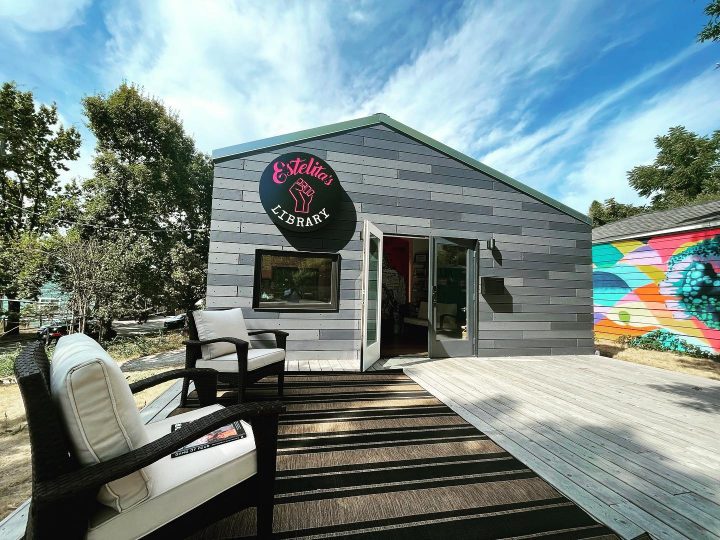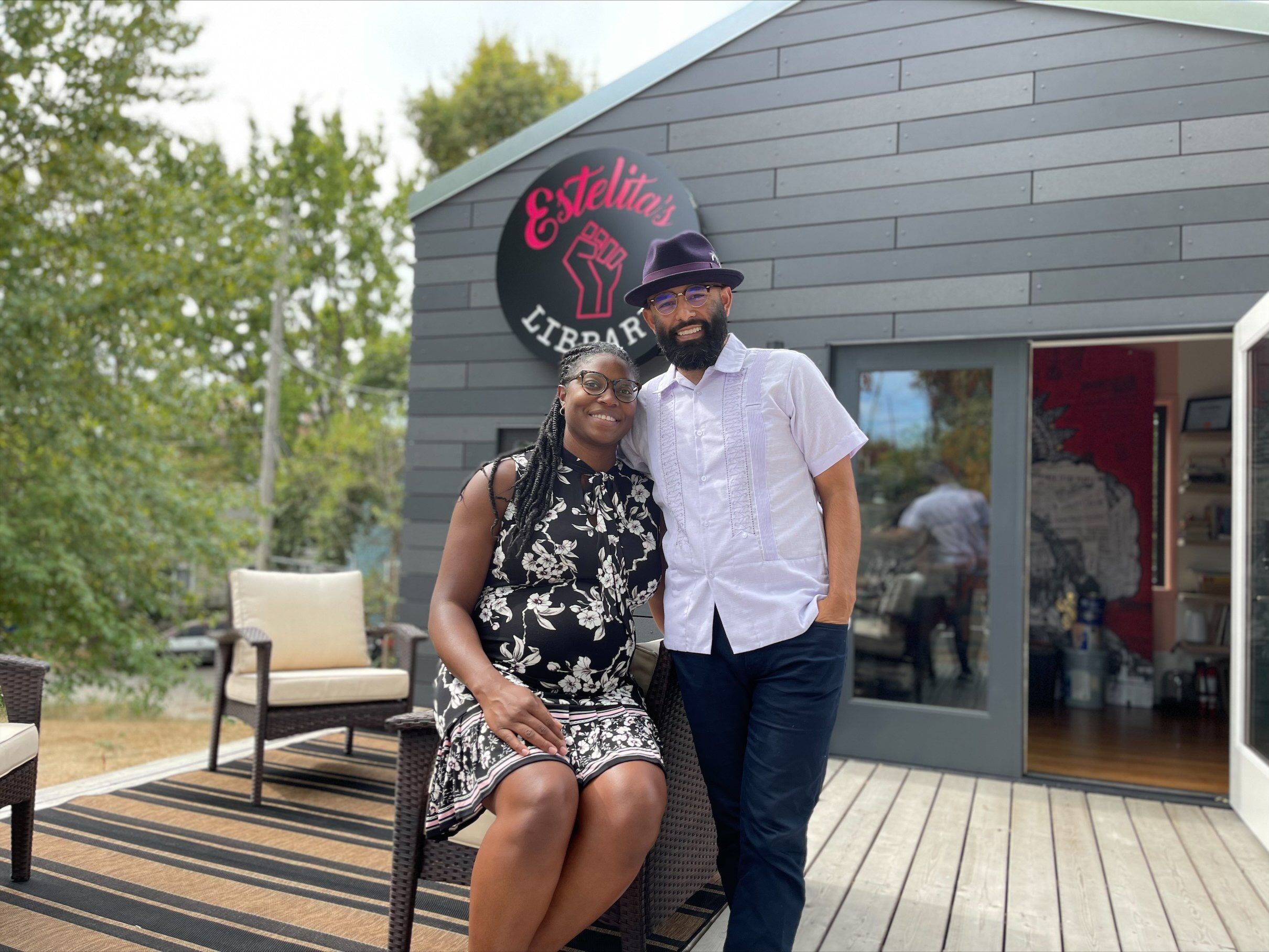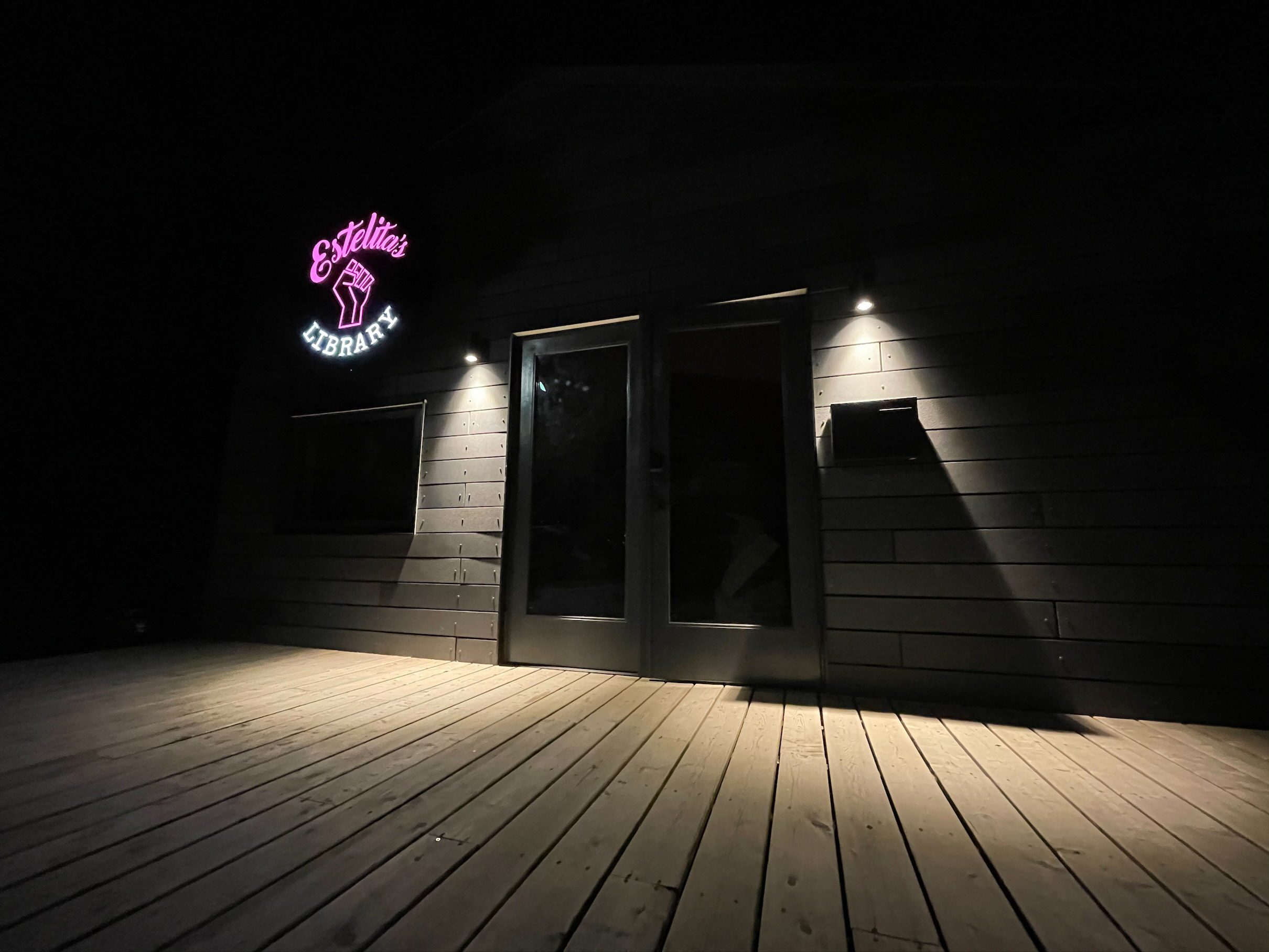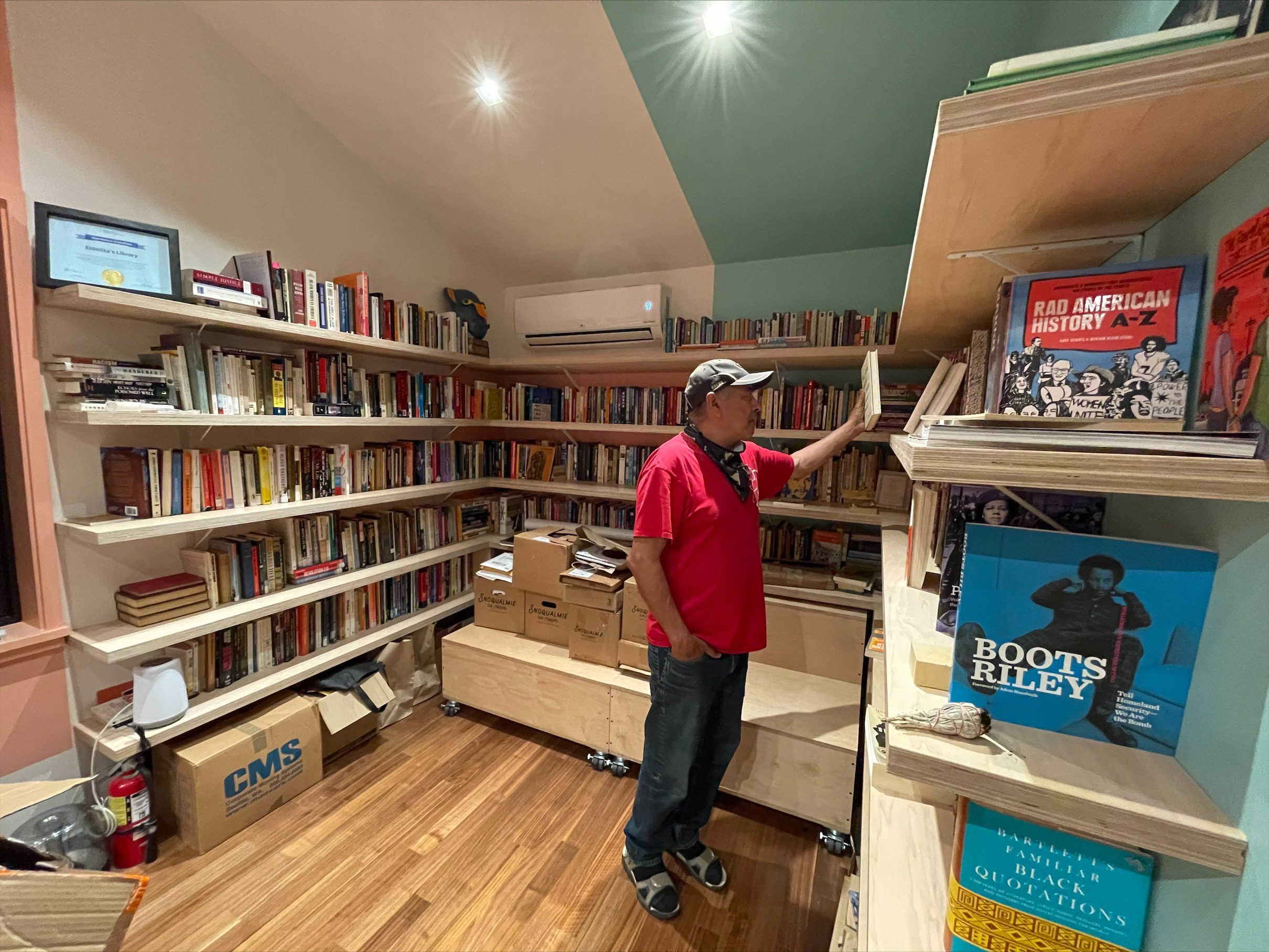
Bookshop Superheroes: Estelita’s Library
September 13, 2021
In appreciation of our local indies who have reinvented their processes and protocols during the past year in the service of getting the just-right book into the just-right hands, our Bookshop Superheroes blog series features interviews with our partner bookstores. This week, we’re featuring Estelita’s Library, who is taking over our Instagram on Wednesday, September 15!
“I think a lot of folks see us as a bookseller, but we’re not,” Edwin Lindo, the curator and co-founder of Estelita’s Library, told us over the phone. “That’s not what we do as as our key priority.” Their real aim? To open a Black and Brown-owned community bookstore and library dedicated to social justice, ethnic studies, and liberation movements, which not only sells books, but also lends them out on a sliding scale membership.
Originally located in Seattle’s Beacon Hill neighborhood, Estelita’s Library has now found a permanent home, on land that they own, in the Central District, thanks to a grant from the Seattle Office of Arts & Culture. Co-owners Edwin and his wife, Dr. Estell Williams, named the endeavor after their daughter, Estella, and seek to bring their childhood experiences of community-building in San Francisco to their work.
Although the location is currently closed due to the pandemic, they’ve been selling books with wild success on Bookshop.org in the meantime, and they’re planning programming for their re-opening—from book talks, to classes, to community-organizing meetings, and more. We spoke to Edwin about these plans, and much more, below.
You do a lot more than provide the community with books—what is Estelita’s, at its core?
We’ve had a lot of booksellers from around the country ask us, Why are you successful? Why is this working? What is Estelita’s Library? At its core, we are a cultural space that explores, interrogates, discusses everything from race and racism to oppression, from liberation to identity. And our library-type format allows exploration here then leads to communities being built in a very organic way. It just so happens that if they are interested in a book that we have, they can go online and buy it.
Then, we have partnerships like ours with SAL, which has been amazing. If we’re thinking about equity, partnerships put equity front and center in saying, How do we support the small local organizations and businesses that wouldn’t necessarily have the opportunity to be a bookseller for a talk with Ijeoma, or with Marc Lamont Hill, or whoever it may be? That changes the game because now people say, well, they must be the bookstore. We have to see who they are and what they’re about. It puts us in the center of the conversation, which we’re grateful for.
We’re also fundamentally different [from other bookstores]. There are booksellers that are in the business of selling books, and we’re a cultural justice focused organization that happens to sell books. That is a different paradigm… I remember my dad telling me, “Just remember, Edwin, when you get paid for doing what you love, you may not love it.” And if you think about it, people who work at a bookshop, more likely than not, love books. You no longer have the time to read the books because you’re doing your best to sell the books so that you can sustain the space of the bookselling and then you ask the question: when do you get to do the thing that you love? That’s a hard question to answer. So now our goal is, how do we put that love at the center, knowing that our community will make sure we’re sustainable?

You’ve moved spaces during the pandemic—can you tell us about that?
We have a space that came from a Tiny Cultural Space Grant, from the Seattle Office of Arts & Culture—that was in partnership with Sawhorse Revolution—and it took three years to build out. But it’s probably one of the most remarkable buildings you’ll ever see. I mean, it’s Estelita’s own building and land, so we don’t pay rent… We aren’t in as much of a hurry as we probably would have been if we were renting a space.
We just want to be discerning and very careful in how we open up… the Delta variant doesn’t necessarily make it easy. But we’re okay: we still build community, but we’re doing it in different ways. Our book sales have now gone online and have completely blown up; we’re talking about thousands and thousands of books being sold, helping sustain this, make this possible.

What’s next for Estelita’s?
We do have a smaller space than we used to, and we have a larger outdoor space, so the goal is leveraging our outdoor space to create events—book talks, poetry readings, community organizing meetings. It is a space for everyone. People have the passcode to this door. And they can just walk in. So how do we turn this idea on its head that if the community knows that it is part of this space, then it will take care of it? If your goal is to keep the community out of this space, and its only role is for it to be a transaction with the community, then you aren’t necessarily in synergy with it. The community doesn’t have a vested interest in it. It’s just a temporal, transactional space that you operate it. For us, we’ve never had anyone steal anything; if anything, people bring more things into the space.
We’re going to get a grant soon to purchase patio furniture. And patio furniture is not inexpensive, right? But I believe in our community enough to say, let’s just leave it out there. We shouldn’t have to find furniture that we fold up, put away and then in the morning, bring it back out. What if our community is as beloved as we have created, that they said, No, we’re not touching that. We’re going to take care of it. We have unhoused folks that live in the RVs across the street that have come to us and said, We just want to let you know that we’re looking out for you. We’re keeping an eye on your space, because we know what it means for this community.
How I know it’s working? When we were first here—we hadn’t even opened the doors, we were just in here cleaning up—a nine-year-old Black girl walks around the corner, comes through our front door here in the new space, knocks on the door, and says, “I hear this is my library.” And we said, “It is.” She comes in and she says, “I heard it’s about Black history.” She stayed for about half an hour, forty-five minutes, and she grabbed some books. She’s like, “So I can just take these and bring them back?” And I said, “Yeah, that’s that’s how your library works.” And she did. I told Estell, I was tearing up when that child was here because I looked at her and thought, “We did it. This is it.” I don’t know what more we can do if all of this time and effort was spent for that moment, for that child to walk in here, then it’s worth it.

How can the community best support you?
At this point in time, it’s really people just buying books online from us. It’s a huge support, it keeps things going, it keeps us sustainable, and it makes sure that we continue programming, we continue investing in our own community. It also puts Estelita’s on the national map, where people ask the question, What is going on in Seattle? And how do I become a part of it? We got into Oprah Magazine late last year; they created a map of Black and Brown-owned bookstores… We have people from across the country reaching out, asking us, how do I create an Estelita’s Library in New York? How do I create an Estelita’s Library chapter in Texas… We haven’t gotten there yet. That’s a vision for sure, but we’re old enough now that we know that patience and consistency is the winner. The phrase that I like to use is, “Consistency will always outweigh the critiques.” And that’s that’s why our goal is simple. Keep the door open. So yeah, buying books, donations are great.
What titles do you find are very popular right now?
Ijeoma Oluo is selling very tremendously—all of her books. Also, a lot of bell hooks, and Octavia Butler, and Angela Davis. What I love to see is that a lot of the Black feminist and revolutionaries who many felt their time had come and gone are actually reemerging as powerful voices, even though they deserved it during their time. I think it’s better late than never.
Like music, you have young people who are exploring and finding things. What gets interesting is when they find them, they make it seem as though it’s brand new—and we’re like, We’re excited that you found it—and we’ve been talking about this for quite some time!
For me, with books, as I tell a lot of the youngsters—books are the place where the secrets are held. And if you have the patience enough to sit and read one, you’re going to find things that are going to implore you and shine light on what you had questions about; you’re gonna find things about yourself. And when you serve it that way, reading no longer becomes a chore. It becomes you, looking for the answer. And that? That becomes a fun thing to do.
Thank you, Edwin and Estelita’s!